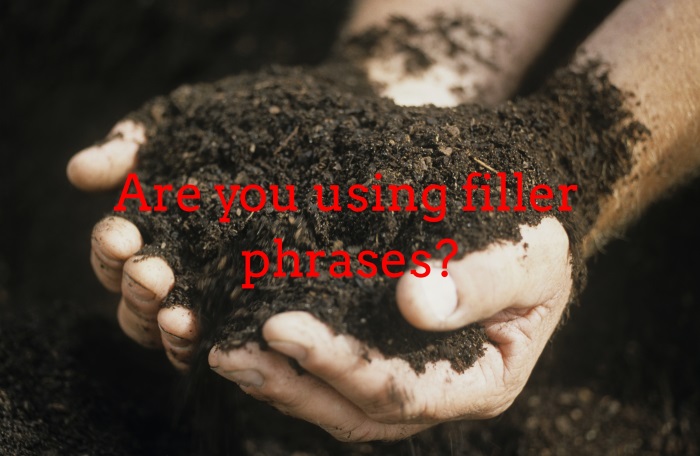You’ve heard people use filler phrases when they talk: “Um”, “Well”, “Really”, or “Like”.
Are you guilty of using filler phrases in your writing?
I heard about a writer who set the goal of removing one unnecessary word from each paragraph of her book. At last count, she had removed 14,000 words from a 400-page manuscript.
You, too, can edit your way to slimmer, trimmer writing.
The Question of Honesty
I honestly believe. To be honest with you. To be truthful.
Is it possible to dishonestly believe? It is, but it’s called fooling yourself.
Not only are the above phrases unnecessary, they can have negative implications. “To be honest with you” implies that you’re not always honest with the person with whom you’re speaking—or maybe with anyone else.
When you insist on your honesty, people will suspect you. It implies that honesty is a choice rather than a habit.
Unnecessary Verification
Of course. As you know. The fact of the matter is. As a matter of fact.
 “Will you mail the package for me?”
“Will you mail the package for me?”
“Of course, I will.”
Use of this filler phrase implies, “How can you doubt me?” Paradoxically, it may make your reliability questionable.
“Of course, this service will continue to grow in popularity.”
Used in this context, “of course,” if not supported by facts, suggests that the reader should believe the statement. It carries a tone of “Everyone knows this; why don’t you?”
“The fact of the matter is” that this is one of the clunkiest and meaningless filler phrase ever devised. Whenever I see it in writing, I imagine it delivered in an aggressive tone, which is an unpleasant association. Delete it wherever you see it.
“As a matter of fact” also qualifies as a useless phrase and also has aggressive overtones.
Unnecessary Taglines
Though dialog is primarily the province of fiction writers, you might interview someone and want to quote them. Watch out for the following:
 “I believe that more women need to assume leadership in business,” she said, throwing cups off the table.
“I believe that more women need to assume leadership in business,” she said, throwing cups off the table.
Someone can speak while throwing items, but the action loses its effect. Instead, you can write:
She threw the cups into the air as she exclaimed, “I believe that more women need to assume leadership in business.”
The action leads the way to the comment. This format also bypasses the trap of writing, “I believe that more women need to assume leadership in business,” she said forcefully (or angrily or vehemently). An action verb always has greater strength than an adverb.
Miscellaneous
At the end of the day. When all is said and done.
Eliminate these award-winning phrases in the category of “most meaningless” (which is a redundant phrase) from your writing.
If you liked this post you’ll love 52 Writing Tips: Fast and Easy Ways to Polish Your Writing. Whether you’re a beginning writer, you want to polish your skills, or you need the determination and inspiration to finish a project, this book will help you. It covers a range of subjects from grammar explained simply, how to skillfully edit your work, essentials of blogging, and how to capture and keep a reader’s attention. 52 Writing Tips: Fast and Easy Ways to Polish Your Writing is the guide you’ve been waiting for.
The book includes several chapters on how to polish your writing skills!



 Pat Iyer is an editor, author, book coach and ghostwriter who helps individuals create books that encourages their expertise to shine and advances their businesses. She has written or edited 48 of her own books.
Pat Iyer is an editor, author, book coach and ghostwriter who helps individuals create books that encourages their expertise to shine and advances their businesses. She has written or edited 48 of her own books.